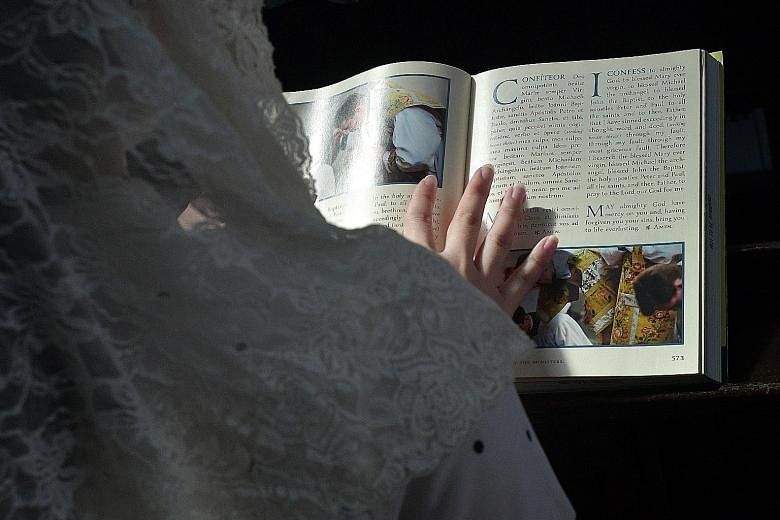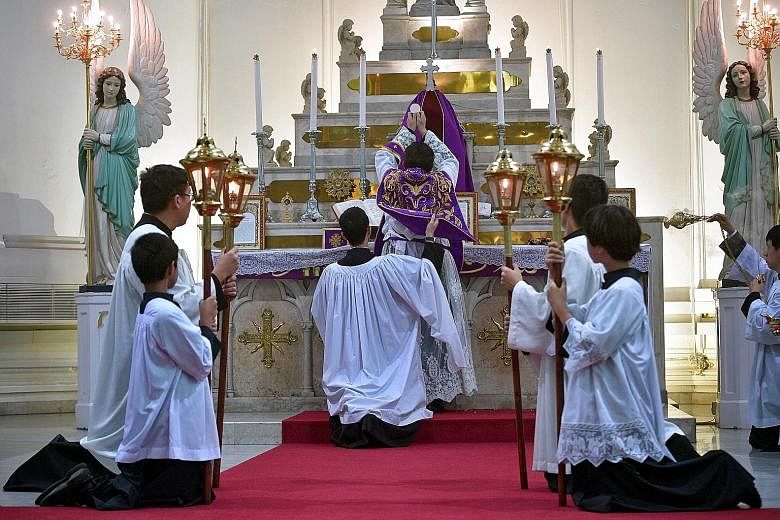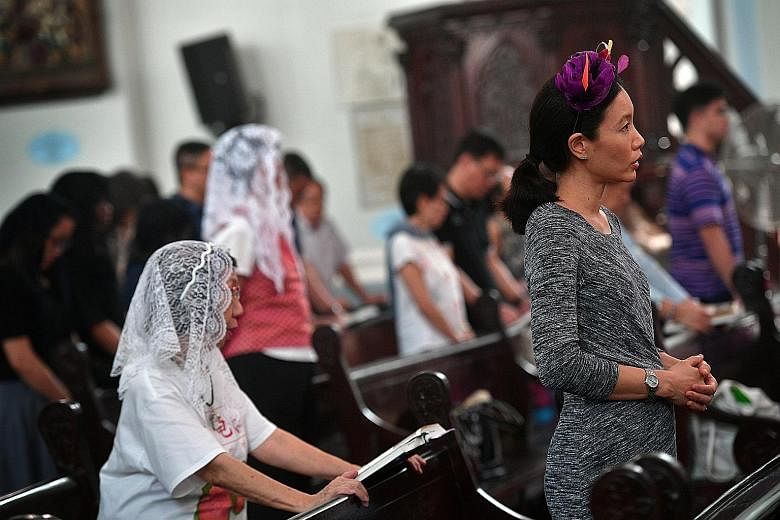It is often dismissed as a dead language but Latin words, and mottos, are brought to life by students of schools such as Victoria, Raffles Institution and Raffles Girls'.
For decades, the Latin words remind students of deeds they must live by. Nil Sine Labore (Nothing without Labour) for Victoria School, Auspicium Melioris Aevi (Hope of a Better Age) for Raffles Institution and Filiae Melioris Aevi (Daughters of a Better Age) for Raffles Girls'.
Latin is also alive in St Joseph's Church in Victoria Street.
Every Sunday, some 200 worshippers, most of whom are Singaporeans, fill the pews of the 110-year-old church and sing out phrases such as Asperges me, Domine, hyssopo, et mundabor - Thou shall sprinkle me with hyssop O Lord, and I shall be cleansed.
Hyssop is a herbaceous plant.
Like the school students, most of the 200 congregants of Singapore's sole Latin mass, which started in 2008, have a basic understanding of the language. The service includes singing Gregorian chants and reciting liturgical responses and prayers.
-
Using Latin
-
ORIGINS OF THE LANGUAGE
Latin emerged in Latium, the region of central western Italy, in the first millennium BC and became the dominant language throughout the Roman Empire.The language was used by the Roman Catholic Church for liturgies, although usage declined within the last 50 years after the Church authorised the use of vernacular languages. This drop has resulted in some Catholics forming groups to continue its use, such as a group in Singapore that started the Latin mass about nine years ago.
ESTIMATED NUMBER OF LATIN SPEAKERS HERE
About five fluent Latin speakers. Some of the 200 congregants of Singapore's Latin mass community within the Roman Catholic Archdiocese here can recite and sing the common Latin prayers. Latin turns of phrase are also used by local lawyers.WHERE TO PICK UP THE LANGUAGE
Most classes are taught by private tutors. Among them is Mr Edward C. Yong who can be reached at edward.yong@kclalumni.net or at the Facebook page of Classical Languages Singapore.
Classes used to be conducted by a private tutor in 2014 and 2015 before mass began at 3pm each Sunday. There are about five fluent speakers in Singapore. The list includes private tutors such as Mr Edward C. Yong and two older Roman Catholic priests, Father Anthony Ho and Monsignor Francis Lau.
While there are others who are familiar with the language, Mr Yong, 35, and other private tutors told The Straits Times that most of them are limited to reading and not speaking the language as it is not widely used here.
Mr Yong has taught about 30 students in Singapore since he started conducting classes in 2007.
He said half the students are Roman Catholics, who see the language as a link to the culture and history of the religion.
Mr Gregory Tan, 39, a life scientist who sings in the choir for the mass at St Joseph's Church, said, up till 50 years ago, masses worldwide were celebrated entirely in Latin.
He added: "Latin, being the mother tongue of the Catholic Church, is able to unify Catholics worldwide since it does not belong to any particular country or ethnic community today."
A number of Catholics, including Mr Tan, aged in their 20s to 40s, became interested in masses celebrated in Latin as a way of rediscovering the roots of the faith.
The Latin mass places emphasis on the Gregorian chant, prayer and silent meditation. Mr Tan said: "The elegant language and the solemn rites enable us to pray better."
Like the other mass attendees, he is also enamoured with the way in which the prayers are chanted.
"The words are taken directly from the Bible, then the music is weaved in to allow the singer to emphasise and highlight words and concepts of theological significance, thereby elevating the level of prayer.
"We get to sing the same songs that were sung by our Catholic predecessors 1,600 years ago," he noted.
But to ensure that everyone can understand the Bible readings for the day, Father Augustine Tay, who celebrates the Latin masses and has a basic understanding of the language, preaches in English.
The group was allocated St Joseph's Church as an official place to worship at in 2013 as part of Archbishop William Goh's efforts to reach out to all the groups in the archdiocese and encourage them to grow spiritually.
Before this, masses were held twice a month at St Joseph's Institution (International) and drew about 80 people.
The legal fraternity also uses Latin phrases as they succinctly capture legal concepts, said Adjunct Professor Kevin Tan of the National University of Singapore's law faculty. "There are some Latin phrases we had to memorise as students but very few of us studied the language.
"It took us years to get familiar with these phrases and, as students, we would walk around with a law dictionary because these Latin phrases would appear in old judgments that we studied," he added.
He noted that steps were taken to remove Latin phrases from Singapore's statutes about four years ago in an effort to reduce legal jargon and simplify legal language.
Ms Estella Young, 38, who is part of the pioneer group of Latin mass worshippers, noted that the language is relatively easy to pick up.
"Most of the Latin words sound and read like the English words they have evolved into," said the housewife who started learning the language in 2006.
For instance, "domine" (Latin for lord) sounds and reads like the English word "dominate", which means "to wield power over".
She added that Latin also experienced a resurgence globally following the release of J.K. Rowling's wildly popular Harry Potter series.
The author had written spells for her characters in Latin.
Ms Young is passing down the language to her children.
She sings and prays with them in Latin before they sleep at night.




